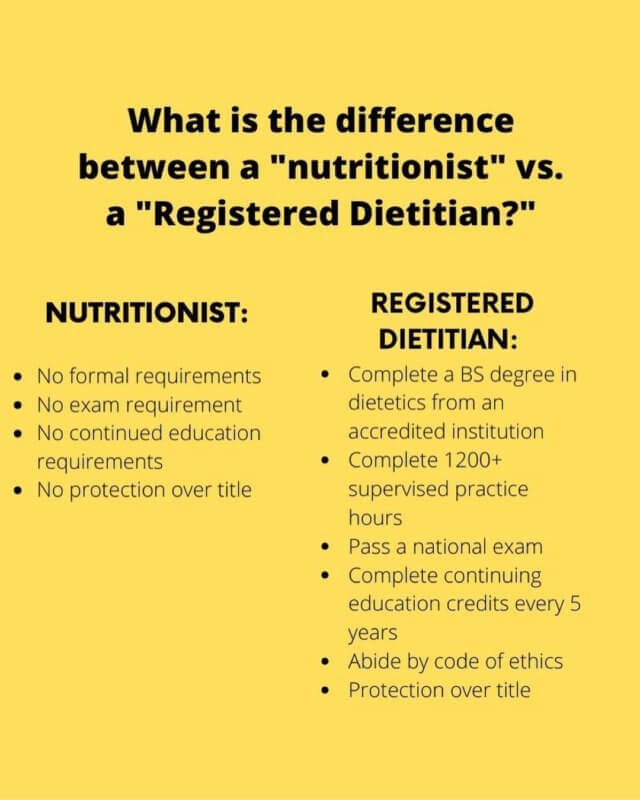All Categories
Featured
Table of Contents
The kinds of Nutritional experts are: and. The former are those people who utilize the clinical technique to study nutrients, both as individual compounds and as they connect in food and nutrition while the last are experts who help in diagnosing the nutritional problems of areas and in locating options to those troubles.
: They deal with health cares and international health organizations.: They are accountable for large-scale food preparation and service.: They are professionals in nourishment and aging. They are Board licensed in Gerontological Nourishment with the American Dietetic Association.: They are mostly included with dietary associated research in the clinical aspect of nourishment in disease states, public element on primary, secondary and occasionally tertiary health and wellness avoidance and foodservice facet in concerns entailing the food prepared for individuals.
What Is The Best Best Nutritionist App?
, and newspapers-- either as an expert visitor point of view, routine columnist or guest, or for source, dining establishment, or dish advancement and critique.: These job under personal technique. As described over, all dietitians are nutritional experts however not all nutritionists have the qualifications and credentials to be called dietitians.
This indicates specifically the exact same thing as Registered Dietitian (RD), a term that has been in use for a long time. While accreditation to end up being an RD or RDN is regulated by the Academy of Nourishment and Dietetics a national organization licensure is controlled by private states.

In order to give medical nourishment treatment and certify as providers for insurance business, a dietitian needs to be certified by the state. According to the Bureau of Labor Data, the demand for dietitians and nutritionists is expected to boost by 20% between 2010 and 2020 this is a much faster growth price than the average for all line of work.
Is It Worth Paying For Medical Nutritionist?
There are substantial distinctions in settlement based upon field of expertise, with Clinical Pediatric Dietitians and Dairy products Nutritionists balancing roughly $90,000. In 2014, The Bureau of Labor Stats (BLS) found that the leading 10% of dietitians and nutritional experts make more than $79,000, and the lower 10% less than $36,000 - Healthy Eating Plans. A mean hourly wage of $27.62 was computed for both sectors, with the top 10% earning above $38.00 per hour, and the bottom 10% earning below $17.00 per hour

There is a variety of work available in different settings for those that want to work with the public, as well as for those that choose even more research-focused work. Several enter among these fields in order to assist people live much healthier lives which can be exceptionally gratifying.
With existing stats that one-third of the U.S. population is obese, in addition to a lot of elderly U.S. residents, dietitians and nutritionists are most likely to have an extra considerable duty in the future. My Plan ranks dietitians and nutritionists at # 53 in their joy index of top 300 jobs with the highest possible task contentment scores.
In enhancement to attending a certified program, most states need dietitians to be certified or to have professional accreditation, or both.
What Is The Best Accredited Nutritionist Program?
Nonetheless, it is necessary to note that starting Jan. 1, 2024, you'll also require to hold a master's degree to make an RD/RDN credential. Common bachelor's levels for dietitians consist of scientific nutrition, dietetics, and public health and wellness. Your core courses may include: Food science Chemistry Healthcare policy Professional nourishment Biostatistics Microbiology Food solution administration You'll additionally require to finish a dietetic teaching fellowship.

Whether composed in regulation or not, dietitians and nutritional experts lots of times require a similar education. Common bachelor's levels for nutritional experts include nourishment science or a related technique, such as dietetics, kinesiology, food system monitoring, or biochemistry and biology.
The variety of hours you'll need might rely on demands in the state where you'll function. Whether you plan to gain a credential or otherwise, it's a good concept to complete at the very least one teaching fellowship to acquire useful experience before looking for a permanent function. Licensing and certification demands for nutritional experts and dietitians vary from state to state.
What Is The Average Cost Of Weight Loss Nutritionist Services?
A specialist qualification demonstrates your know-how and knowledge in your field. Here are the leading certifications for dietitians and nutritional experts.
The titles are essentially the exact same. There's no professional difference between them, and you're complimentary to choose which one you wish to make use of based on personal choice. To take the accreditation exam, you need to: Earn an undergraduate level that's accredited by the ACEND Total a dietetics internship After Jan. 1, 2024, you'll need to gain a master's level to certify for the certification.
Which Is The Best Best Nutritionist For Weight Loss Service?
Bureau of Labor Stats places dietitians and nutritionists in the same classification and states they gain a average annual wage of $69,680. There is a variety in wages, with the lower 10% around $44,910 and the top 10% around $98,830, according to the BLS. Nutritionist and dietitian functions are expected to grow 6.6% through 2032, according to the BLS.
This doesn't mean that one profession is exceptional to the other, as they both have different features and qualifications that may sometimes overlap. If you intend to find out more regarding what makes these professions distinctive, keep reading. Diet professionals are specialists who help improve the lifestyle through healthy and balanced food choices.
Is It Worth Paying For Certified Nutritionist?
Nutritionist advice about nutrition's influence on wellness. The field is less regulated than dieticians; hence, nutritionists' levels of expertise and credentials can differ.
There are numerous differences in between diet professionals and nutritional experts. Right here are the training and history requirements. Diet professionals generally hold a bachelor's level in dietetics, nutrition, or a relevant area. As their jobs breakthrough, many dieticians pursue advanced degrees, like a Master's or Doctorate, to be experts in specific locations of nutrition. Diet professionals must embark on monitored sensible training as component of their education and learning to gain hands-on experience in professional settings, area nutrition programs, or food service management.
Latest Posts
Performance Nutritionist (Marmion)
What Is The Best Fertility Dietitian Software?
How Much Should I Pay For Before After Body Transformation Services?